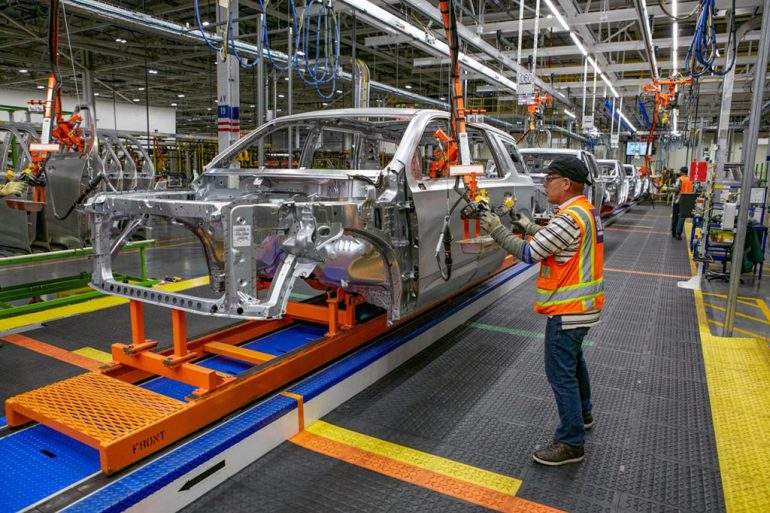
In the ongoing automotive labor dispute, the United Auto Workers (UAW) union initiated a strike at General Motors’ (GM) assembly plant in Arlington, Texas. This plant is responsible for manufacturing GM’s profitable full-size sport utility vehicles, which include popular models such as the Chevy Tahoe, Chevy Suburban, GMC Yukon, and Cadillac Escalade.
The strike in Arlington marks the third major disruption in the global automotive industry, as workers at Ford’s Kentucky Truck heavy-duty pickup factory and Stellantis’ Ram pickup plant in Sterling Heights, Michigan, are already on strike. This coordinated action by UAW has now brought to a halt the operations of three of the most profitable auto factories worldwide, causing significant economic repercussions.
GM reported that the Arlington walkout has doubled the weekly cost of the strike to $400 million, compared to the previous estimate of $200 million. In response, GM expressed disappointment in the escalation of the strike, labeling it as “unnecessary and irresponsible.”
Meanwhile, negotiations between the UAW and the three major automakers – GM, Ford, and Stellantis – continue. The UAW has presented Stellantis with a new contract proposal and is expected to deliver a counteroffer to GM shortly. Bargainers are waiting for a revised offer from Ford, who has claimed that their previous offer was at the limit of affordability while remaining competitive.
The UAW’s strategy of targeted strikes over the course of 40 days has significantly impacted the revenue of the Detroit Three automakers, with fewer than half of the 150,000 UAW members at these companies foregoing pay and participating in the picket lines. This disruption has also begun to affect other industries, from airlines to auto parts suppliers.
Despite the strikes, GM reported a stronger-than-expected third-quarter profit but withdrew its full-year financial forecast due to the uncertainty surrounding the ongoing labor disputes. UAW President Shawn Fain declared that it was time for GM workers and the broader working class to receive their fair share of profits, indicating that a settlement could be near but warning that negotiations could get tougher in the final stages.
The exact gap between the union and the automakers remains unclear, with the automakers already offering wage hikes exceeding 23% and additional cost-of-living increases taking total compensation offers over 30%. Fain’s insistence on more favorable terms is a calculated gamble that the automakers will be willing to allocate more resources to improve UAW wages and benefits, potentially impacting dividends, share buybacks, or capital spending budgets.
Detroit Three automakers have not declared a formal impasse, but the possibility remains on the table. Executives are increasingly concerned about the financial distress that smaller and medium-sized suppliers could face due to the strike, with larger suppliers like Corning and Illinois Tool Works warning of adverse financial consequences.
The impact of the strike extends to thousands of UAW workers at supplier operations connected to the automakers, including about 5,000 at the Arlington, TX GM plant, further highlighting the ripple effect on the industry. Estimates suggest that after five weeks of strikes, the economic losses for the auto industry have surpassed $9.3 billion.
Despite the financial strain, the UAW strike fund is expected to remain at $750 million by the end of the week, according to Wells Fargo. The union and the automakers are also grappling with negotiations concerning future wages and unionization policies for electric vehicle battery plants, complicating the talks as these ventures operate separately under U.S. labor law.
In the financial markets, GM, Ford, and Stellantis shares have remained relatively stable, reflecting a perception on Wall Street that the UAW negotiations may be entering their final phase. Labor experts suggest that the union’s tactic of targeting profitable plants is a strategic move to expedite a settlement.

Mike Floyd is a finance executive by trade and a car enthusiast at heart. As a CFO with a keen eye for detail and strategy, Mike brings his analytical mindset to the automotive world, uncovering fresh insights and unique perspectives that go beyond the surface. His passion for cars—especially his favorite, the Porsche 911, fuels his contributions to Automotive Addicts, where he blends a love for performance and design with his professional precision. Whether he’s breaking down industry trends or spotlighting emerging innovations, Mike helps keep the site both sharp and forward-thinking.